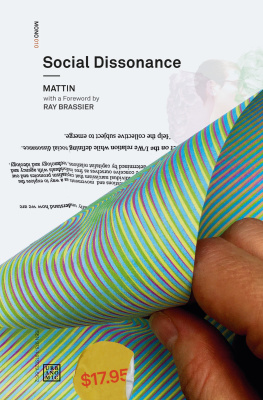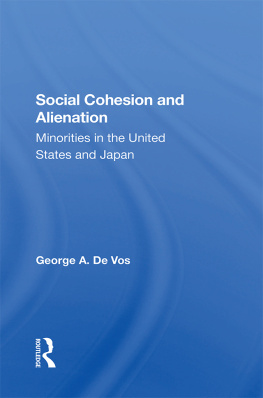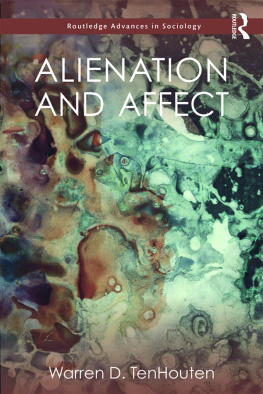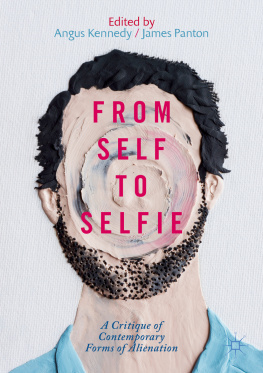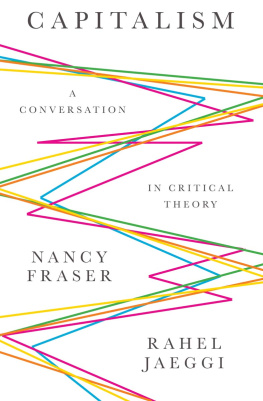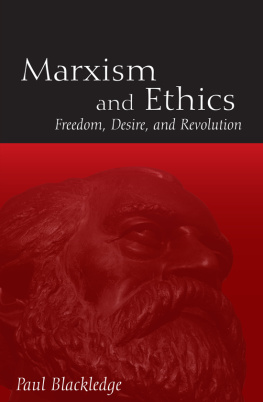ALIENATION
NEW DIRECTIONS IN CRITICAL THEORY
NEW DIRECTIONS IN CRITICAL THEORY
Amy Allen, General Editor
New Directions in Critical Theory presents outstanding classic and contemporary texts in the tradition of critical social theory, broadly construed. The series aims to renew and advance the program of critical social theory, with a particular focus on theorizing contemporary struggles around gender, race, sexuality, class, and globalization and their complex interconnections.
Narrating Evil: A Postmetaphysical Theory of Reflective Judgment, Mara Pa Lara
The Politics of Our Selves: Power, Autonomy, and Gender in Contemporary Critical Theory, Amy Allen
Democracy and the Political Unconscious, Nolle McAfee
The Force of the Example: Explorations in the Paradigm of Judgment, Alessandro Ferrara
Horrorism: Naming Contemporary Violence, Adriana Cavarero
Scales of Justice: Reimagining Political Space in a Globalizing World, Nancy Fraser
Pathologies of Reason: On the Legacy of Critical Theory, Axel Honneth
States Without Nations: Citizenship for Mortals, Jacqueline Stevens
The Racial Discourses of Life Philosophy: Ngritude, Vitalism, and Modernity, Donna V. Jones
Democracy in What State? Giorgio Agamben, Alain Badiou, Daniel Bensad, Wendy Brown, Jean-Luc Nancy, Jacques Rancire, Kristin Ross, Slavoj iek
Politics of Culture and the Spirit of Critique: Dialogues, edited by Gabriel Rockhill and Alfredo Gomez-Muller
Mute Speech: Literature, Critical Theory, and Politics, Jacques Rancire
The Right to Justification: Elements of Constructivist Theory of Justice, Rainer Forst
The Scandal of Reason: A Critical Theory of Political Judgment, Albena Azmanova
The Wrath of Capital: Neoliberalism and Climate Change Politics, Adrian Parr
Media of Reason: A Theory of Rationality, Matthias Vogel
Social Acceleration: The Transformation of Time in Modernity, Hartmut Rosa
The Disclosure of Politics: Struggles Over the Semantics of Secularization, Mara Pa Lara
Radical Cosmopolitics: The Ethics and Politics of Democratic Universalism, James Ingram
Freedoms Right: The Social Foundations of Democratic Life, Axel Honneth
Imaginal Politics: Images Beyond Imagination and the Imaginary, Chiara Bottici
ALIENATION
RAHEL JAEGGI
Translated by Frederick Neuhouser and Alan E. Smith
Edited by Frederick Neuhouser
COLUMBIA UNIVERSITY PRESS
NEW YORK

COLUMBIA UNIVERSITY PRESS
Publishers Since 1893
New York Chichester, West Sussex
cup.columbia.edu
Copyright 2014 Campus Verlag GmbH
English edition copyright 2014 Columbia University Press
ISBN 978-0-231-53759-9 (e-book)
The translation of this work was funded by Geisteswissenschaften InternationalTranslation Funding for Work in the Humanities and Social Sciences from Germany, a joint initiative of the Fritz Thyssen Foundation, the German Federal Foreign Office, the collecting society VG WORT, and the Brsenverein des Deutschen Buchhandels (German Publishers and Booksellers Association).
All rights reserved
Library of Congress Cataloging-in-Publication Data
Jaeggi, Rahel.
[Entfremdung. English]
Alienation / Rahel Jaeggi; translated by Frederick Neuhouser and Alan E. Smith; edited by Frederick Neuhouser.
pages cm.(New directions in critical theory)
Includes bibliographical references and index.
ISBN 978-0-231-15198-6 (cloth: alk. paper) ISBN 978-0-231-53759-9 (e-book)
1. Alienation (Social psychology) 2. Self psychology. I. Title.
HM1131.J3413 2014
302.5'44dc23
2013044698
A Columbia University Press E-book.
CUP would be pleased to hear about your reading experience with this e-book at .
Jacket Design: Jason Alejandro
References to Web sites (URLs) were accurate at the time of writing. Neither the author nor Columbia University Press is responsible for URLs that may have expired or changed since the manuscript was prepared.
CONTENTS
Axel Honneth
Frederick Neuhouser
Axel Honneth
NO CONCEPT HAS BEEN MORE powerful in defining the character of early Critical Theory than that of alienation. For the first members of this tradition the content of the concept was taken to be so self-evident that it needed no definition or justification; it served as the more or less self-evident starting point of all social analysis and critique. Regardless of how untransparent and complicated social relations might be, Adorno, Marcuse, and Horkheimer regarded the alienated nature of social relations as a fact beyond all doubt. Today this shared assumption strikes us as strange, for it seems as though these authors, above all Adorno, should have realized that the concept rested on premises that contradicted their own insight into the danger of overly hasty generalizations and hypostatizations. For the concept of alienationa product of modernity through and throughpresupposes, for Rousseau no less than for Marx and his heirs, a conception of the human essence: whatever is diagnosed as alienated must have become distanced from, and hence alien to, something that counts as the human beings true nature or essence. Philosophical developments of the past decades on both sides of the Atlantic have put an end to such essentialist conceptions; we now know that even if we do not doubt the existence of certain universal features of human nature, we can no longer speak objectively of a human essence, of our species powers, or of humankinds defining and fundamental aims. One consequence of this theoretical development is that the category of alienation has disappeared from philosophys lexicon. And nothing signals more clearly the danger that Critical Theory might become obsolete than the death of what was once its fundamental concept.
Yet in recent years it has seemed to more than a few philosophers that our philosophical vocabulary lacks something important if it no longer has the concept of alienation at its disposal. It is often the case that we can hardly avoid describing individual forms of life as alienated; not infrequently we tend to regard social conditions as failed or false, not because they violate principles of justice but because they conflict with the conditions of willing and of executing what we will. In such reactions to the conditions of our social world we inevitably find ourselves falling back on the concept of alienation, even if we are aware of its essentialist dangers; as antiquated as the talk of alienation may be, it apparently cannot simply be eliminated from our diagnostic and critical vocabulary. This book can be understood as a philosophical defense of the legitimacy of the category of alienation. Its aim is to revive for us today the social-philosophical content of this reviled concept.
The author, Rahel Jaeggi, is completely aware of the difficulties that such an undertaking entails. Updating the category of alienation requires not only the conceptual skills necessary for explicating its meaning in such a way that, without losing its critical force, it avoids essentialist presuppositions; beyond this, it must also be shown that it is truly indispensable for a critical diagnosis of the conditions of social life. In tackling the first task the author is helped by the fact that she is equally well versed in the classical history of the concept of alienation and in recent, analytically oriented debates concerning the nature of personhood and freedom. This familiarity with two philosophical traditions that until now have been split off from each other enables her to identify precisely those places in the classical concept of alienation where essentialist consequences can be avoided by relying on more formal accounts of human capacities. With respect to the second task, the author benefits from a considerable talent for the phenomenological description of everyday life. This talent enables her to depict human phenomena such as rigidity, the loss of self, and indifference so vividly that the reader is virtually compelled to look for ways of recovering the concept of alienation. These two philosophical sources define the strategy and landscape of the present investigation: it begins with a historical sketch of the concept of alienation that makes clear both the conceptual strengths and the essentialist presuppositions of the concept; in its main section it brings to light, through descriptions of types of individual self-alienation, the analytic potential of recent accounts of human freedom, which it then uses to establish a concept of alienation free from the defects of essentialism.
Next page

